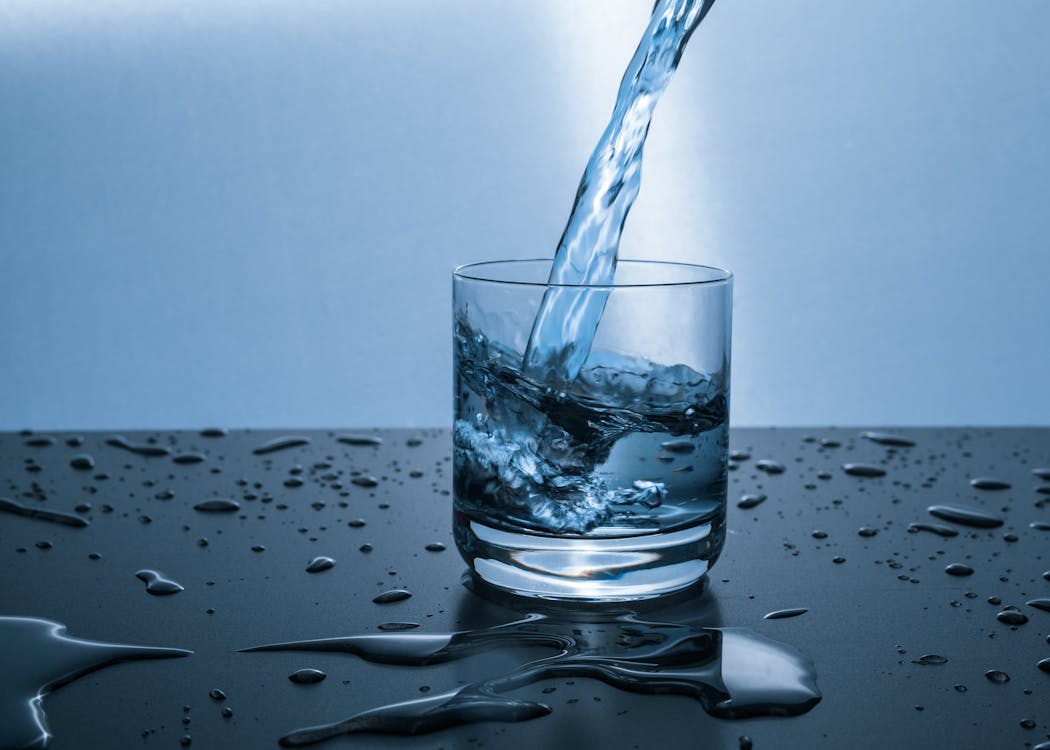Importance Of Water In The Body
Water makes up about 55-60% of the body weight of an average human being. The lungs are nearly 90% water, blood is 83% water, brain and lean muscles are 75% water, bone is 22% water, and body fat is 10% water.
Therefore, a person can survive for up to 4 weeks without food but no longer than 3 days without water. Water performs many vital functions in the body, it:
moistens tissues such as those in the eyes, nose, and mouth,
regulates body temperature,
protects body organs and tissues,
lubricates joints,
helps prevent constipation,
lessens the burden on liver and kidneys by flushing out waste products and toxins,
transports nutrients and hormones around the body, and
maintains the delicate balance of mineral concentrations within the cells.
Every day you lose water through your breath, perspiration, urine, and bowel movements. For your body to function properly, you must replenish your water supply by consuming beverages and foods that contain water.

How Much Water Do You Need Every Day?
A general rule of thumb is to take your body weight in pounds divided by 2 and you get the number of ounces required per day. For instance, if you weigh 150 pounds, you should drink 75 ounces of fluid or slightly over nine 8-oz glasses.
Clean, filtered water is your best choice of fluid and it has 0 calories!
Other beverages that count as your daily fluid intake include regular and decaffeinated tea and coffee, broth, fruit and vegetable juices, milk, energy drinks, sweetened beverages and artificially-sweetened diet drinks. However, watch out for the amount of caffeine, sugar, artificial chemicals, and sodium that may be present in these beverages as over consumption of these ingredients may lead to long-term health problems.
Harmful Effects Of Dehydration
Common causes of dehydration include intense diarrhea, vomiting, fever, or excessive sweating. Exercise and not drinking enough water during hot weather may also cause dehydration.
Dehydration may lead to fatigue, migraines, constipation, muscle cramps, irregular blood pressure, kidney problems, and dry skin. There is even a risk of death if you become severely dehydrated.
Make sure you catch the early symptoms of dehydration:
Thirst. If you feel thirsty, you are already dehydrated. Don't forget to hydrate throughout the day, especially during hot weather or when you exercise or drink alcohol. For every alcoholic drink, it is prudent to replenish with a glass of water.
Hunger. Most people mistake hunger as the indication to eat, whereas actually, you may be dehydrated. When you feel hungry, drink a glass of water and wait 15 minutes to see if the hunger pangs disappear.
Dark yellow/orange urine. Urine is usually pale yellow to clear when you have sufficient water intake. Dark color or strong smell indicates you need to drink more water.
Water makes up about 55-60% of the body weight of an average human being. The lungs are nearly 90% water, blood is 83% water, brain and lean muscles are 75% water, bone is 22% water, and body fat is 10% water.
Therefore, a person can survive for up to 4 weeks without food but no longer than 3 days without water. Water performs many vital functions in the body, it:
moistens tissues such as those in the eyes, nose, and mouth,
regulates body temperature,
protects body organs and tissues,
lubricates joints,
helps prevent constipation,
lessens the burden on liver and kidneys by flushing out waste products and toxins,
transports nutrients and hormones around the body, and
maintains the delicate balance of mineral concentrations within the cells.
Every day you lose water through your breath, perspiration, urine, and bowel movements. For your body to function properly, you must replenish your water supply by consuming beverages and foods that contain water.

How Much Water Do You Need Every Day?
A general rule of thumb is to take your body weight in pounds divided by 2 and you get the number of ounces required per day. For instance, if you weigh 150 pounds, you should drink 75 ounces of fluid or slightly over nine 8-oz glasses.
Clean, filtered water is your best choice of fluid and it has 0 calories!
Other beverages that count as your daily fluid intake include regular and decaffeinated tea and coffee, broth, fruit and vegetable juices, milk, energy drinks, sweetened beverages and artificially-sweetened diet drinks. However, watch out for the amount of caffeine, sugar, artificial chemicals, and sodium that may be present in these beverages as over consumption of these ingredients may lead to long-term health problems.
Harmful Effects Of Dehydration
Common causes of dehydration include intense diarrhea, vomiting, fever, or excessive sweating. Exercise and not drinking enough water during hot weather may also cause dehydration.
Dehydration may lead to fatigue, migraines, constipation, muscle cramps, irregular blood pressure, kidney problems, and dry skin. There is even a risk of death if you become severely dehydrated.
Make sure you catch the early symptoms of dehydration:
Thirst. If you feel thirsty, you are already dehydrated. Don't forget to hydrate throughout the day, especially during hot weather or when you exercise or drink alcohol. For every alcoholic drink, it is prudent to replenish with a glass of water.
Hunger. Most people mistake hunger as the indication to eat, whereas actually, you may be dehydrated. When you feel hungry, drink a glass of water and wait 15 minutes to see if the hunger pangs disappear.
Dark yellow/orange urine. Urine is usually pale yellow to clear when you have sufficient water intake. Dark color or strong smell indicates you need to drink more water.
Comentarii
Trimiteți un comentariu